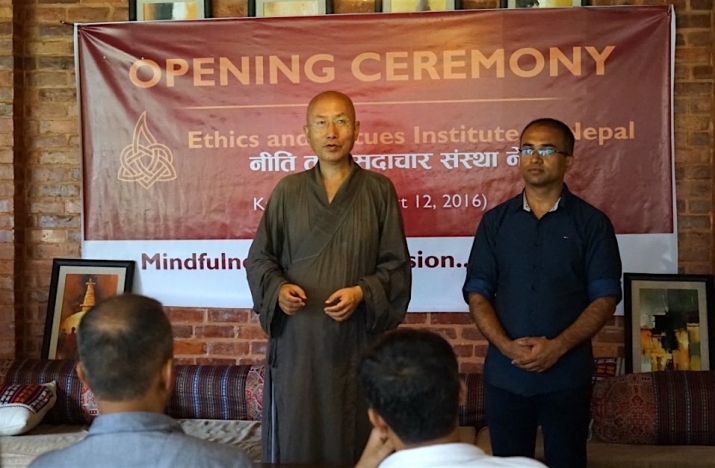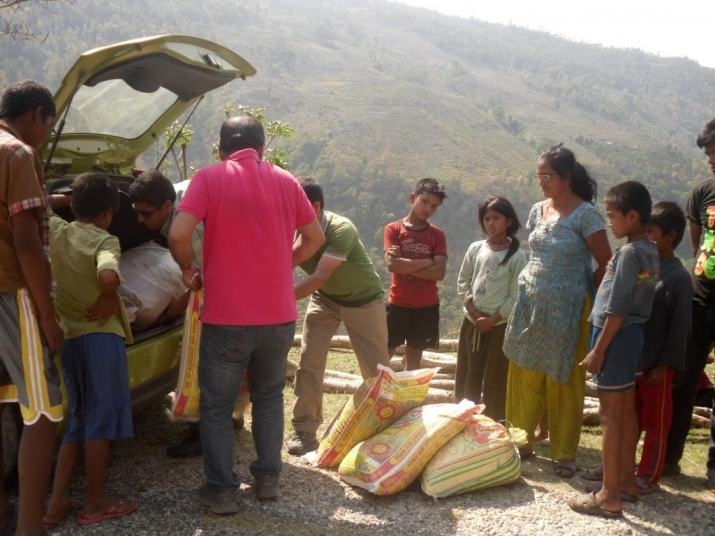NEWS
Buddhist Scholar Ven. Hin Hung Inaugurates Ethics and Virtues Institute of Nepal
 Ven. Hin Hung, director of the Centre of Buddhist Studies at the University of Hong Kong, noted that most human suffering is unnecessary and can be avoided. From kathmandupost.ekantipur.com
Ven. Hin Hung, director of the Centre of Buddhist Studies at the University of Hong Kong, noted that most human suffering is unnecessary and can be avoided. From kathmandupost.ekantipur.comAt a ceremony held in Kathmandu on Friday, the renowned Buddhist monk and scholar Venerable Hin Hung formally inaugurated the Ethics and Virtues Institute of Nepal (EVINS Nepal) non-governmental organization, during which he gave a keynote address on compassion and the nature of human suffering.
EVINS Nepal is a registered non-profit organization based in Kathmandu that aims to promote spiritual values and virtues, with a view to building a society based on ethical, virtuous, and compassionate values. The organization holds meditation and stress-reduction classes for adults, as well as classes on meditation, yoga, and ethical values and virtues for children to help them grow into potential future leaders. The institute conducts research on spiritualism, meditation, and stress-reduction programs, and also provides financial support and aid to underprivileged communities as well as educational scholarships.
Ven. Hin Hung, who is also an author and the director of the Centre of Buddhist Studies at the University of Hong Kong, observed during his address that most human suffering is unnecessary and could be easily avoided.
“The sufferings are created by the humans themselves. People do bad karma due to attachment and hatred. This leads to suffering. And most of these sufferings are unnecessary,” he said, noting that it is possible for anyone to become free of hatred and greed by generating wisdom with the help of the Buddha’s teachings. (Kathmandu Post)
 EVINS Nepal distributes rice, lentils, cooking oil, salt, and dried soybeans to a small village in Nepal’s Dolakha District, some 100km east of Kathmandu, where most homes were destroyed in last year’s earthquakes. From EVINS Nepal Facebook
EVINS Nepal distributes rice, lentils, cooking oil, salt, and dried soybeans to a small village in Nepal’s Dolakha District, some 100km east of Kathmandu, where most homes were destroyed in last year’s earthquakes. From EVINS Nepal Facebook“Due to hatred, people resort to destruction. Due to greed, people accumulate things and crave for things that they don’t need,” Ven. Hin Hung continued. “They even go to war for this reason. Ignorance is at the root of it, which leads us to do things that create misery for ourselves and others. He stressed on the importance of wishing well for all and reminded the audience that the key to making one’s life happier and more peaceful are the practices of loving-kindness and compassion. (Kathmandu Post)
“Conduct based on ethical and virtuous values will guide us to behave correctly,” he said. “It will guide us to create compassion and loving-kindness among people. It helps to eliminate ignorance, hatred, and greed. It helps our families and societies to live in wisdom.” (Kathmandu Post)
While in Kathmandu, Ven. Hin Hung also gave a talk titled “Buddhism in the 21st Century” at Lumbini Buddhist University, during which he expressed appreciation for the efforts of scientists and researchers in making Buddhist education more easily accessible. He also emphasized that modern scientific research has shown that the practice of meditation and Buddhist teachings have a demonstrable positive impact on people’s physical, mental, and emotional health.
Earlier this year, EVINS Nepal organized a seminar on “Neuroscience & Meditation” in Kathmandu, led by French Buddhist monk and best-selling author Matthieu Ricard, sometimes known in the media as “the happiest person in the world.” Some 100 neurologists, psychological counselors, yoga teachers, educationists, social workers, and journalists participated in the seminar. The event included a 15-minute loving-kindness meditation session conducted by Ricard, who observed that within a matter of a few weeks, regular practice of loving-kindness meditation can have a healing effect on the practitioner’s brain, including structural and functional changes.
See more
Buddha's teaching can alleviate human suffering: Buddhist scholar Hung (Kathmandu Post)
Most of human suffering unnecessary: Hin Hung (Lokântar)
Ethics and Virtues Institute of Nepal
Ethics & Virtues Institute of Nepal (Facebook)














